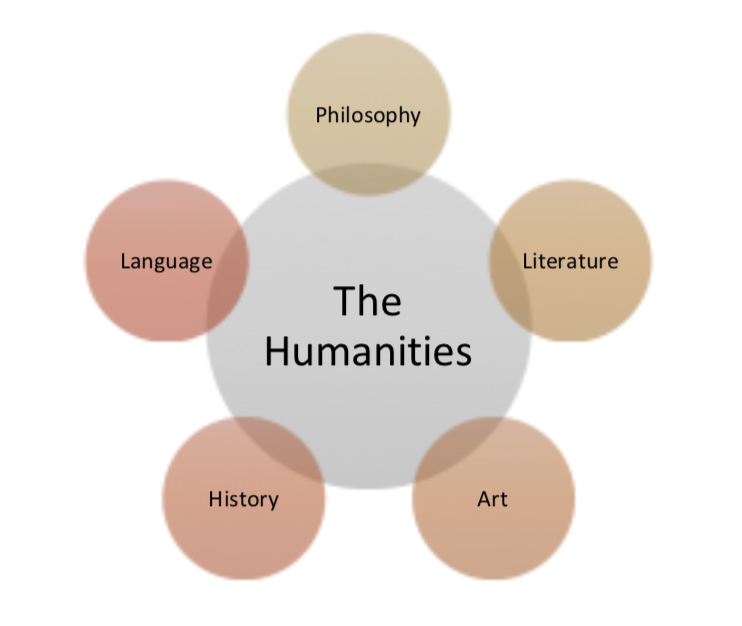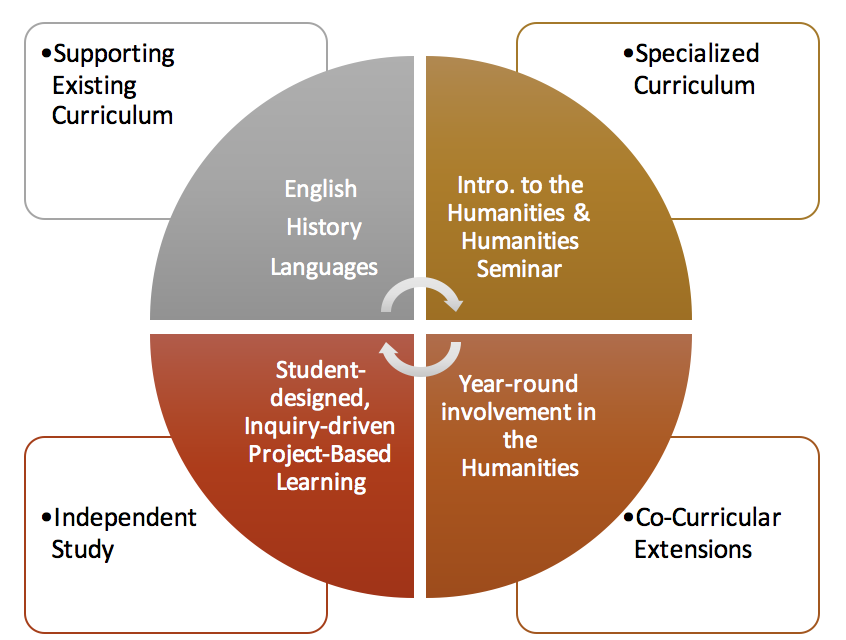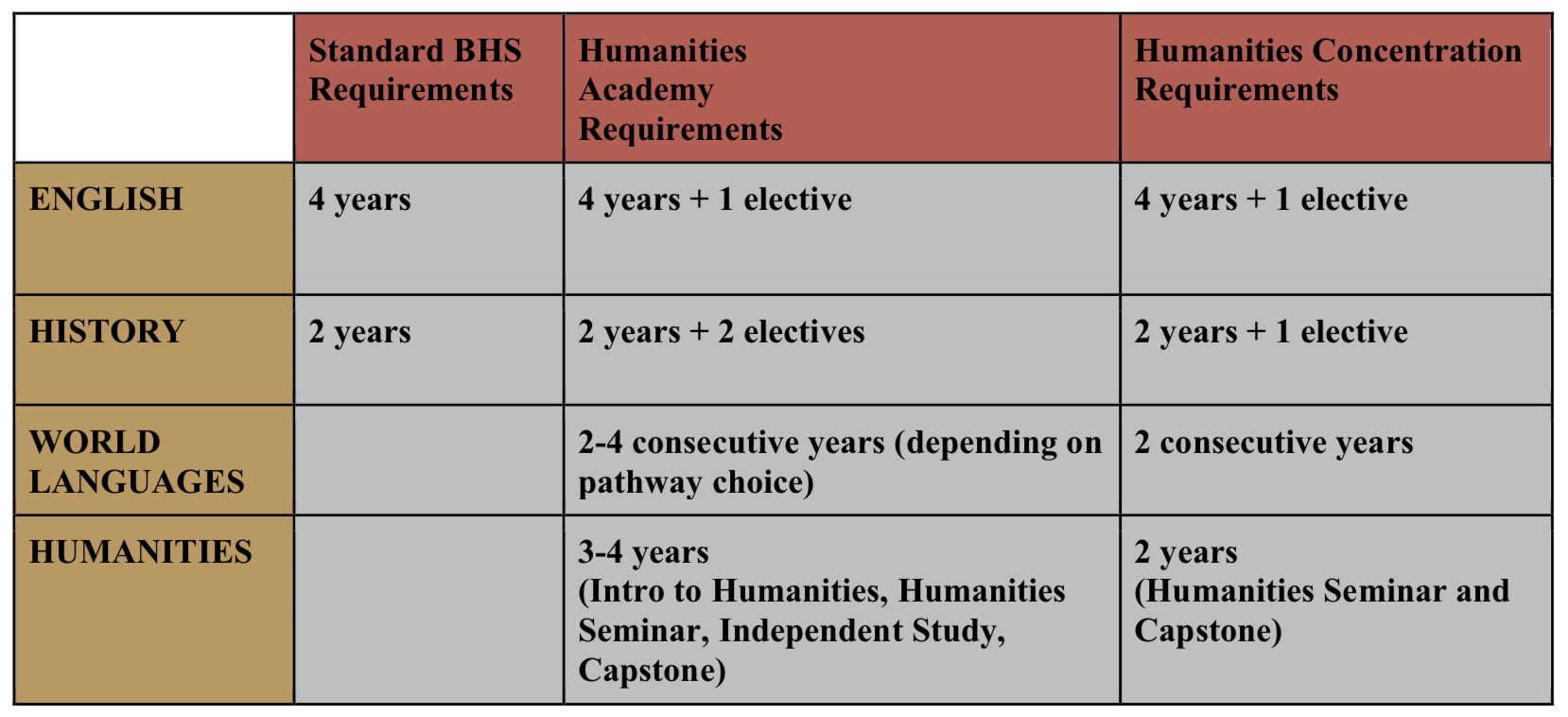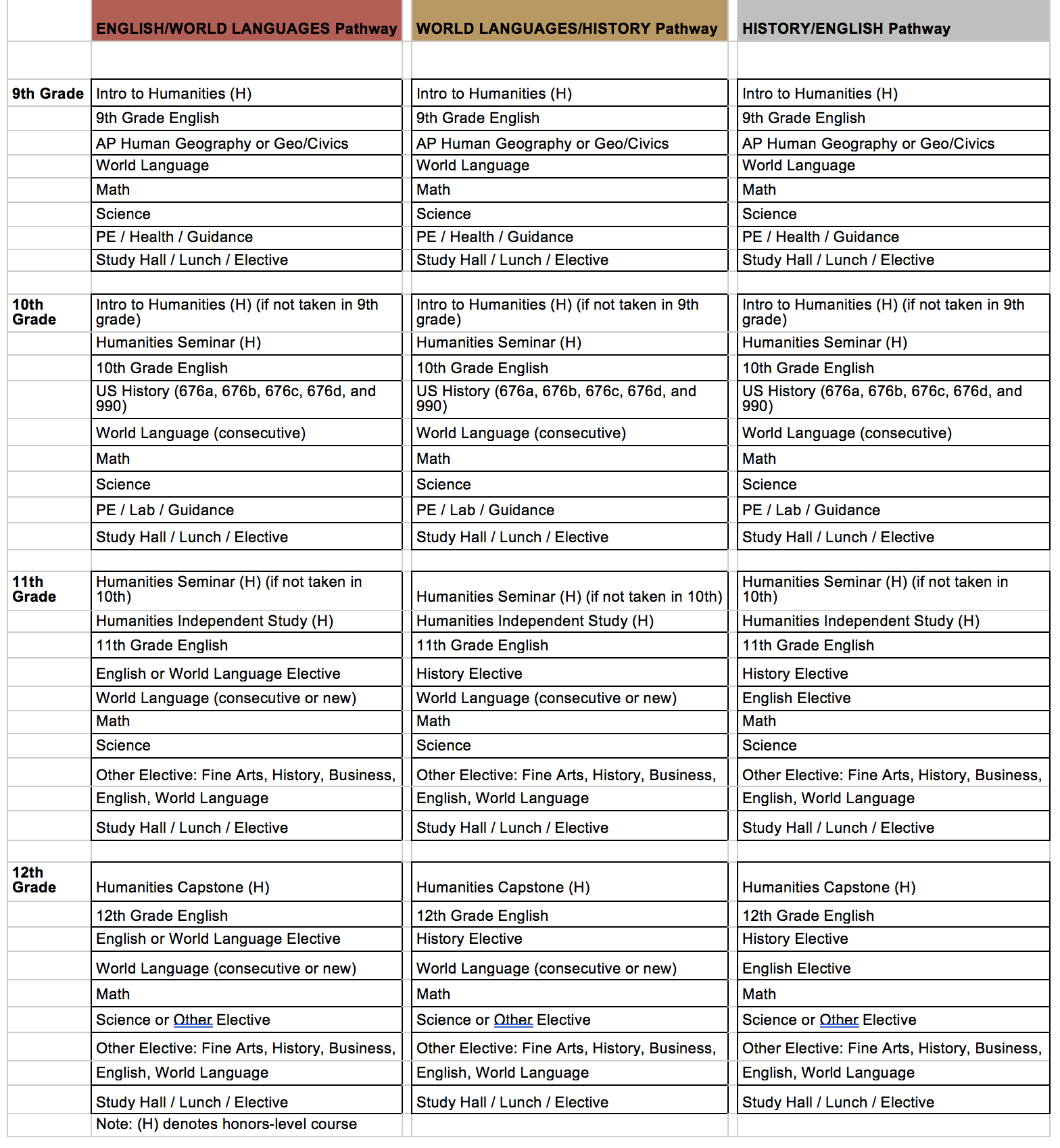Athletics
Student Life
School Registration
For Families
Defining the Humanities
The Humanities can be described as the study of all the ways in which people try to record and understand human experience. By exploring philosophy, literature, language, art, and history, students learn how to think creatively and critically, to reason, and to ask questions. These skills allow students to gain new insights into the human experience, adding to their knowledge about our world. Through work in the Humanities, students learn about the values of different cultures, about what goes into making a work of art, about how history is made. Coursework in the Humanities helps students understand the world we live in and gives them tools to imagine the future.

Study the Humanities at BHS
The Humanities Academy at Bangor High School eagerly welcomes students to an innovative program which originated in the fall of 2016. Students who choose to enroll in the BHS Humanities Academy complete all the traditional Bangor High School graduation requirements while simultaneously completing a challenging and enriching sequence of courses and experiences designed to help students better understand the world and their place in it. Under our model, academically motivated and enthusiastic students are offered an extensive choice of programs and opportunities designed to help them understand the human story in all of its diversity.
Designed to dovetail with the school’s existing culture and tradition of excellence and informed by compelling research on the importance of a Humanities education to our workforce and global economy, the BHS Humanities Academy is a rigorous academic program with a foundation in a seminar approach that scaffolds students toward independent research and a final capstone project.
Students may choose to join the Humanities Academy as freshmen or sophomores, and they have the additional option of completing a Humanities concentration if they join as a junior. The BHS Humanities Academy offers students a carefully structured approach, requiring students to hone skills in inquiry, critical thinking, close reading, communication, and historical analysis. In addition, students will engage in apprentice project-based learning with experts in the Humanities, and commit to participation in Humanities-based activities throughout the schoolyear (a minimum of 2 co-curricular activities per year) and during the summer (a minimum of 10 hours).
The BHS Humanities Academy is a program option available to all Bangor High School students (tuition and non-tuition) and is designed for students who:
love to read, write, and learn about the world;
are interested in going beyond the minimum requirements in English, History, or World Languages;
want to find connections among these academic disciplines.
Humanities students will choose one of three pathways: English/History, English/World Languages, and World Languages/History.
Academy Structure

The BHS Humanities Academy is a program option within Bangor High School open to all enrolled students. While the name may imply separation, the BHS Humanities Academy is overseen administratively in the same manner as all of Bangor High School’s excellent instructional programs.
Opting for the BHS Humanities Academy begins with understanding what it means to be a global citizen. The BHS Humanities Academy curriculum is designed to purposefully and directly align course content over the four-year classroom experience with the students’ progression through seminar style courses, advanced curriculum in at least two of the three key Humanities departments (English, History, World Language), extension activities which engage students in learning about the human experience, and independent research culminating in a final capstone project.
The BHS Humanities Academy curriculum consists of three distinct components: 1. Existing English, History, and World Language courses such as would be found in any liberal arts high school program; 2. Humanities courses introducing and developing methodologies and tools associated with inquiry, critical thinking, close reading, communication, and historical analysis; and 3. A long term inquiry project which occurs over two academic years (for full Academy students).
Humanities Academy: 4-Year Overview

Year 1: Introduction to the Humanities in the ninth-grade exposes students to core Humanities concepts and focuses coursework on exploring culture. The course is scheduled for the final period of each school day and operates as a seminar.
Year 2: Students expand their understanding of the Humanities in the Humanities Seminar, an advanced course exploring issues surrounding diffusion and identity, alienation and belonging, otherness and commonality, and globalization.
Years 1 & 2: Students participate in a special partnership with the Metropolitan Opera to understand how different cultures express themselves through art forms, how we use art for self-expression, how music can be said to be a universal language, and how stories reveal truths about human nature. Students will attend a minimum of 4 operas streamed Live in HD at UMaine’s Collins Center for the Arts.
Year 3: Students choose a pathway combining 2 of 3 Humanities curriculum areas (English/History, English/World Language, History/World Language). In addition to the required coursework for the chosen pathway, students will engage in an independent study facilitated by an expert in the Humanities, completing a literature review about a self-selected topic in the Humanities.
Year 4: The independent study experience extends from the junior year into the senior year, culminating in successful completion of a Capstone Project and a formal presentation of the student’s inquiry project.
Years 1-4: BHS Humanities Academy students must document participation in a minimum of 2 co-curricular activities and a minimum of 10 hours of work in the Humanities over the summer.
Examples of co-curricular activities include (but are not limited to) participation in the following BHS clubs or activities: Speech/Debate, Theatre, The Civil Rights Team, Poetry Out Loud, World Language Clubs.
Examples of summer activities could include (but are not limited to): viewing foreign films, attending cultural performances, travel to historical sites, reading texts in the Humanities.
Humanities Academy Curriculum

Humanities Academy Course Descriptions
Introduction to Humanities (9th Grade)
Introduction to Humanities is the core course for Humanities Academy students that develops inter-disciplinary strands through a combined study of literature, history and languages. In this one-year, team-taught elective, students will explore language regions through translated texts; historical, anthropological, geographical and language contexts; and cultural experiences, including poetry, art, film, and music. Students will develop collaborative and critical thinking skills as they explore the universalities of human experience and patterns of global cultures. Through a seminar approach, students will examine and analyze evidence from multiple sources in different disciplines through group projects and class discussions. Humanities Academy Students Only.
Humanities Seminar (10th Grade)
The Humanities Seminar is the follow-up course for Humanities Academy students that further develops inter-disciplinary strands through a combined study of literature, history and languages. In another one-year, team-taught elective, Humanities Seminar students will explore the phenomenon of cultural interaction through translated texts; historical, anthropological, geographical and language contexts; and cultural experiences, including poetry, art, film, and music. Students will further hone collaborative and critical thinking skills as they explore the universalities of human experience and patterns of global cultures by investigating issues of diffusion & identity, alienation & belonging, otherness & commonality, and globalization. Through a seminar approach, students will critically examine and analyze evidence from multiple sources in different disciplines through group projects and class discussions.
Prerequisite: Introduction to Humanities
Independent Study (11th Grade)
The Independent Study is a one-year course designed to help students in the Humanities Academy to prepare for their Capstone experience. The student will have completed Introduction to Humanities and Humanities Seminar and will be ready for a more individualized opportunity for study. For students in the Humanities Academy all four years, the Independent Study is a first step toward completion of independent work, which will be expanded through the Capstone experience. Prior to the Independent Study year, students will identify their chosen pathway toward completion (English/History, History/World Language, or English/World Language), and then choose two mentor teachers (one from each discipline) to mentor them through the Independent Study year as they pursue an inquiry project culminating in a literature review.
Capstone Project (12th Grade)
This senior-year culmination of the Humanities Academy is a creative and original project that will include (but not be limited to): connections among disciplines (according to chosen Pathway); evidence of community or professional collaboration; evidence of understanding of global citizenry; formal written component; research into topic; and presentation to teachers, administrators, and/or outside evaluators.
Humanities Project Descriptions
Research in the Humanities takes an inquiry-based approach that is both interpretive and analytic. Because the human experience cannot be adequately captured by facts and figures alone, humanities research often poses questions about common assumptions, uncovers new meanings in artistic works, or finds new ways to understand cultural interactions. As a result, students’ participation in the Humanities Independent Study and Capstone courses will work to help students think critically about the human experience and the world and their place in it, in the hope that they will discover better understandings of the past and in turn, help us prepare for a better future.